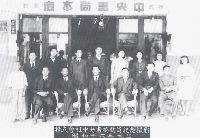
上架日期:2019/4/19
中央書局
1921年,臺灣文化協會於臺北成立。1925年,臺灣文化協會於臺中召開全島大會,會中決定籌辦文化服務機構。1925年12月,中央書局在文化協會重要成員莊垂勝四處奔波、籌資,取得大雅張濬哲、張煥圭兄弟大力支持,在洪元煌、張聘三等人協助下,並結合林烈堂、林獻堂、蔡培火、楊肇嘉等中部知名士紳,至1926年間莊垂勝等人很快募齊四萬元股金,與彰化銀行成立時所備資金相去不遠,並於同年6月30日在綠川邊臺中醉月樓召開創立總會,中央書局於是在隔年1927年1月3日正式開幕。
中央書局創設位址為臺中市寶町三丁目十五番地(為今日臺中市中區市府路103號,天主教聖母聖心修女惠華診所附設曉明護理之家現址),是文化協會風起雲湧間,在臺中建立的重要據點,初時以「俱樂部」構想,欲設置食堂、講堂、娛樂室等,舉辦各式講習、演講、音樂、電影放映等,但因各種因素,其他營業項目未能實現,只有書局此一文化事業蓬勃經營,留存下來。
書局當時發起人衆,以莊垂勝為首,亦有林獻堂、林幼春、陳虛谷、張深切、賴和等一時文人仕紳。中央書局是當時中臺灣專門進口漢文及日文書籍雜誌的書局,也是全臺少數販售漢文、中國圖書及中文唱片的書局。同時,書局內也販售文具及學藝用品、洋畫材料、運動器具及服裝、留聲機及西洋樂器等商品,並自行出版少量圖書。
1930年代起,中央書局作為臺籍文人仕紳們重要的文化據點,多種雜誌陸續以中央書局作為發行據點,如1932年的《南音》、1934年臺灣文藝聯盟的《臺灣文藝》,二戰後初年的《新知識》和《文化交流》,或為主張臺灣本地人意志和漢語文,或為傳播時事與文化,看出當時仕紳文人對時局的用心與急切。而1930年代,張星建任中央書局支配人(即營業部主任),除有一支主編雜誌的健筆,亦為優秀的藝術策展人辦展、尋求合作機會,可惜英年早逝,1949年於綠川大正橋(今民權路綠川橋)遭暗殺。
1947年「二二八事件」爆發,莊垂勝、葉榮鐘等臺籍仕紳,面對時局動盪,曾在中央書局等地商談集會。同年3月1日,作家楊逵與友人於中央書局成立「輿論調查所」欲發行輿論調查卡,經鍾逸人(後為二七部隊部隊長)建議,改為印傳單宣傳市民大會,隔日全市民眾便於臺中戲院前舉行市民大會,不久後接管政府機構,由青年與學子組成的「二七部隊」成立,是臺中在二二八事件時的武裝抗暴。
中央書局現址位於市府路、臺灣大道口,原為日治時代書局的員工宿舍和倉庫,1949年遷建至隔壁、於現址營業,是一棟三層樓高的折衷主義式建築,頂部圍繞牆頭有花草飾帶,由於地處街角,因此造型為弧形量體設計,內部桁架為格子樑系統,外圍呈放射線伸出,幾近落地式的窗戶,使得內部空間顯得明亮。遷建於現址後,中央書局開始恢復圖書出版,後設立「出版委員會」。
自1927年至1998年歇業,漫長71年歲月中,中央書局一直是臺中重要的文化堡壘,舉凡在臺中生活過的文人,幾乎都曾流連中央書局,如櫟社時代的林獻堂、林幼春等研究傳統詩,中央書局是進口中國書籍的窗口。臺中的前輩作家楊逵、張深切都是中央書局的常客。詩人陳千武則在少年時代常沉浸中央書局,受到文學的啟蒙、誘發。至於二戰後中生代作家、出身大甲的路寒袖,高中就讀臺中一中,在校即和同學興辦「繆詩社」,熱衷於新詩創作。在浪漫的文學少年時代,中央書局是他放學、休假最愛流連的處所,坐在書局磨石子的地上,欣賞一本又一本的文學名著,莎士比亞的《羅蜜歐與茱莉葉》、《李爾王》、《仲夏夜之夢》……等,就是免費在中央書局讀完。
1998年面對連鎖書店競爭的中央書局,在董事長張耀錡召集董事會議後決議歇業,正式走入歷史,並將建物售出,現址曾作為舞蹈教室、安全帽店。2015年上善人文基金會為了延續中央書局推動文化思潮的精神,進行建物整修及營運規劃,於2018年重新開業。
莊垂勝
莊垂勝生於1897年初的日治時代初年,字遂性,號負人,別號徒然居士、了然居士,著有《徒然吟草》等書,原籍彰化鹿港,臺灣作家、詩人、社會運動者,日治時曾參與臺灣文化協會,並創辦中央書局。日治時期得霧峰林家資助留學日本,畢業於明治大學政治經濟科,回臺後與葉榮鐘等人從事文學活動,活躍文壇;並參與臺灣文化協會活動。
第二次世界大戰結束後,國民政府接收臺灣,他奉臺灣省行政長官公署派任為臺灣省立臺中圖書館(即今之國立臺中圖書館)首任館長。莊垂勝曾自謙:「『圖書館館長』不過是地方小廟裡的『廟公』。」於館長任內,他仍悉心推出文化講座、婦女讀書會和談話會等三項活動,使圖書館發揮民眾參與功能。
1947年「二二八事件」爆發,臺中市市長黃克立在3月2日逃走,市民在同年3月4日成立「時局處理委員會」,推舉莊垂勝主持,任主任委員。3月11日,委員會解散,解散前這段期間,臺中圖書館是時局處理委員會成員集會的地方。4月18日,莊遭免職圖書館館長,並經歷抓捕、審問、關押。最後雖然全身而退,卻從此沉默,晚年和臺中東海大學的徐復觀教授來往密切,研究儒學。1962年莊垂勝因肺癌病逝,留有遺詩八十四首,由後人林莊生、林敬生編成《徒然吟草》詩集。
莊垂勝其子林莊生(從母姓),出生於臺中霧峰吳厝庄的大家族,他在遷居美國多年之後,驚覺長輩日漸凋零、臺灣也由農業社會轉型為工業社會,因而對已消失或正在消逝中的舊臺灣產生無限思念,覺得應該記錄下來,寫作《懷樹又懷人》一書,紀念父親、以及大時代變遷下的文化協會與當時代文人。
-
Central Bookstore & Chuang Chui-Sheng
The Taiwanese Cultural Association (TCA) was established in Taipei in 1921. TCA convened an island-wide conference in Taichung in 1925, and in the meeting a decision to establish a cultural services institution was made. In December 1926, Chuang Chui-Sheng, an important member of the TCA, raised funds to set up the Central Bookstore with great support from the Daya Chang brothers, Chang Jui-Che and Chang Huan-Kui, and other renowned gentry including Lin Lieh-Tang, Lin Hsien-Tang, Tsai Pei-Huo and Yang Chao-Chia. Until 1926, they collected 40,000 dollars, which is about the capital fund of Chang Hwa Commercial Bank, and was having its first bookstore founding meeting in Taichung Miyahara, located alongside of the Green River (Luchuan). The following year, Central Bookstore was inaugurated on Jan. 3rd, 1927.
Central Bookstore was first established at No.15, 3 Chome, Taka-Machi (currently the Stella Mututina Social Welfare Foundation at No.103, Shifu Rd., Central Dist., Taichung City). This became an important foothold in Taichung for supporting TCA’s activities. As a stronghold of the Taiwanese Cultural Association, in the beginning Central Bookstore sold Japanese and Chinese books. It also planned to evolve into a “club” type bookstore, including setting up diners, lecture rooms, and entertainment rooms to hold all kinds of seminars, speeches, concerts or even movie-playing events. However, due to various reasons, except for its cultural related business, which had prospered and continued its operation, none of the other ideas were put into execution.
The scholars and gentry who helped to develop the Central Bookstore included Chuang Chui-Sheng, who was the leader at the time, Lin Hsien-Tang, Lin Yu-Chun, Chen Hsu-Ku, Chang Shen-Chieh, and Lai Ho. Central Bookstore at the time was a bookstore that specially sold imported books and magazines in classical Chinese and Japanese. It was also one of the few bookstores in Taiwan that sold classical Chinese language books, Chinese books, and Chinese music records. Meanwhile, the bookstore also sold merchandise like stationery, learning supplies, materials for western-style painting, sports equipment, clothes, records, and western musical instruments. It also published a small quantity of books.
Starting from the 1930s, the Central Bookstore became an important cultural stronghold for Taiwanese scholars and gentry. Various magazines used Central Bookstore as their publication base, such as the “Nan-Yin” Magazine in 1932, “Taiwan Literature” by the Taiwan Literature & Art Association (TLAA) in 1934, and “New Knowledge” and “Cultural Exchange” in the first year after the war. The Central Bookstore not only advocated the will power of the local Taiwanese and the Chinese language, but also propagated current affairs and culture. From here we can see how attentive and anxious the local scholars and gentry were about the political situation at the time. In the 1930s, Chang Hsing-Chien was the head (i.e. Sales Director) of the Central Bookstore. Besides his ability to utilize his swift and fierce writing power to edit various magazines, he also helped to hold exhibitions or find cooperative opportunities for gifted art curators. However, unfortunately, Chang died at a young age. He was assassinated on the Luchuan Dazheng Bridge (today’s Luchuan Bridge on Minquan Rd.) in 1949.
1947 was the year of the February 28 Incident. Chuang Chui-Sheng, Yeh Jung-Chung and other Taiwanese scholars and gentry convened meetings in the Central Bookstore and other places to discuss the political turmoil. On March 1 of the same year, the writer Yang Kui and his friends established a “Public Opinion Investigation Center” in the Central Bookstore and wanted to publish public opinion investigation cards. But upon the suggestion by Chung I-Jen (later captain of the 27 Force), they changed to print leaflets to propagate the “General Citizen Assembly”, which was held the next day in front of the Taichung Theatre with the participation of all the Taichung city citizens. Soon after, the “27 Force” was established by youngsters and school students to take over government forces. The 27 Force became an armed force to resist violence in Taichung during the February 28 Incident.
The current location of the Central Bookstore is at the corner of Shifu Rd. and Taiwan Blvd. The place was the bookstore staff’s dormitory and warehouse during the Japanese Colonial Period. In 1949, the bookstore moved to its current location. Central Bookstore is a three-story building with an eclectic architectural style. The top of the building was adorned with floral and grass sashes. And because it was located on the street corner, the building had a curved design. The inner truss adopted a lattice system which radiated out from the center. Big windows that extended from the ceiling to close to the floor provided sufficient light for the inner space. After moving to its current location, the Central Bookstore started to publish books again, and later on established a “Publications Committee”.
From 1927 to 1998, a period of 71 years, the Central Bookstore always played the role of an important cultural fortress in Taichung. Almost all the scholars that had once lived in the Taichung area had spent time there. For example, Lin Hsien-Tang and Lin Yu-Chun once studied traditional poetry here. Central Bookstore once imported books from Mainland China. The senior writer in Taichung, Yang Kui, and Chang Shen-Chieh were also frequent customers. Poet Chen Chien-Wu often stayed in Central Bookstore when he was young and so was inspired by the literature he read there. Lu Han-Hsiu, who was a post-1970s writer after the war and was originally from Dajia, studied in Taichung First Senior High School. During his time there, he founded “Miu Poetry Club” with other students and was keen on creating new styles of poetry. In his romantic young literary days, Central Bookstore was the place he loved the most, and he spent most of his time there. He often sat on the terrazzo floor in the bookstore enjoying the literary masterpieces, from Shakespeare’s “Romeo and Juliet”, “King Lear”, to “A Midsummer Night’s Dream”. He read all these in the bookstore for free.
In 1998, facing competition from chain stores, Director Chang Yao Chi convened a board meeting that resolved to close the bookstore. The Central Bookstore officially became a part of Taichung’s history. The building was sold. The old location was used as a dance studio and a helmet store. In March 2015, Shang Shan Human Culture Foundation would like to keep inspiring the culture of thinking which Central Bookstore has devoted and acquired the building and mapped out a way to restore the building to its original appearance. The project is planned to be completed in 2018.
Chuang Chui-Sheng
Chuang Chui-Sheng was born in early 1897 during the Japanese Colonial Period. He styled himself as “Sui-Hsing”, “Fu-Jen”, “Tu-Jan Layman”, and “Le-Jan Layman”. He wrote poetry collections like “Tu Jan Yin Tsao”. Chuang was originally from Lugang, Changhua and was a writer, poet, and social activist. He once joined the Taiwanese Cultural Association during the Japanese Colonial Period and established the Central Bookstore. In the Japanese Colonial Period, he once received funding support from Wufeng’s Lin Family to study in Japan. He received a degree from the Political Economy Dept. of the Meiji University. After he returned to Taiwan, he and Yeh Jung-Chung devoted a lot of their time to cultural activities and were very active in literary circles. He also participated in activities held by the Taiwanese Cultural Association.
After WWII, the National Government took over Taiwan. He was appointed by Taiwan’s Provincial Administrative Executive Office to serve as the very first Library Director of the Taiwan Province Taichung Library (today’s Taichung Public Library). Chuang once modestly said, “Director of the Library” was just a “temple host” of a local small “temple”. During his time as Library Director, he carefully planned to convene three activities including cultural seminars, a woman’s study group, and a discussion group, and tried to develop the library’s function so as to encourage the participation of Taichung’s citizens.
When the February 28 Incident happened in 1947, the Mayor of Taichung City, Huang Ke-Li, fled. The citizens of Taichung established the “Council to Cope with the Times” on March 4 of the same year. They elected Chuang Chui-Sheng to host the meeting and to serve as the Chief of the Council. On March 11, the council was dismissed. Before the council’s dismissal, Taichung Library was the assembly for council members. On April 18, Chuang was removed from his post as library director. He was then arrested, interrogated, and detained. Although at last he was free from all his troubles, he became a silent man from that time on. In his later years, he had a close relationship with Professor Hsu Fu-Kuan of the Taichung Tung Hai University and studied Confucianism. Chuang Chui-Sheng died of lung cancer in 1962 and left 85 poems which his sons, Lin Chuang-Sheng and Lin Chin-Sheng, compiled into the poetry collection, “Tu Jan Yin Tsao”.
His son, Lin Chuang-Sheng (who took his mother’s surname), was born into a big family in Wucuo Village, Wufeng, Taichung. He emigrated to the United States where he lived for many years until one day he suddenly found that the elders of the family were gradually disappearing and Taiwan had also transformed from an agricultural into an industrial society. He suddenly missed the old Taiwan which had either already disappeared or was gradually disappearing, and began to think about recording it. Thus, he wrote the book “To Miss the Trees and Miss the Man” to commemorate his father and the Cultural Association during the changing times, as well as all the scholars and gentry of the time.

 Facebook
Facebook
 Twitter
Twitter
 LINE
LINE